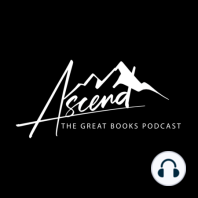90 min listen

Iliad: Book 2 | The Great Gathering of Armies
Iliad: Book 2 | The Great Gathering of Armies
ratings:
Length:
67 minutes
Released:
Jan 9, 2024
Format:
Podcast episode
Description
Deacon Harrison Garlick and Adam Minihan take a slow read of Book 2 of The Iliad. Adam is not sure about this book, but by the end of the discussion, Deacon Garlick has talked Adam off the ledge.Book TwoThe Great Gathering of ArmiesThe rage of kings is strong—they’re nursed by the gods, their honor comes from Zeus—they’re dear to Zeus, the god who rules the world.Odysseus (2.226)14. What happens in the second book of the Iliad?Having accepted the petition of Thetis, Zeus sends a “murderous dream” to Agamemnon imploring him to muster his army and attack Troy (2.07). It is notable that “Dream” is personified, as is the “Dawn,” as a goddess (2.57), and Rumor, as “Zeus’ crier” (2.109). Agamemnon receives the dream and shares it with his war council (2.63). The high king or chieftain of the Greeks then elects to test his men (2.86) and tells the army Zeus commands them to return to “Argos in disgrace” (2.129). The men rush to the ships to leave (2.174), but Hera sends Athena to intervene (2.183). Athena inspires Odysseus who in turn rouses the men to stay—reminding them of Calchas’ prophecy they would conquer Troy in the tenth year (2.386). Nestor, the oldest of the Achaean war lords, encourages the men to stay as well (2.398), and, notably, Agamemnon only thanks Nestor afterward (2.439). There is then a roll call of the Achaean kings (2.573). The book ends with a similar roll call for the Trojans, which serves to introduce Prince Hector, commander of the Trojans and son of Priam, King of Troy (2.927). 15. What is the relation between Zeus and the kings of men?Odysseus declares, “The rage of kings is strong, they’re nursed by the gods, their honor comes from Zeus—they’re dear to Zeus, the god who rules the world” (2.226). Zeus’ governance of the world is, at least in part, mediated through the kings of men. Homer provides such an example by Zeus working his will by influencing the actions of Agamemnon via the dream (2.07). The episode sheds further light on the relation between the will of Zeus and the free will of man. Note also, however, that the dream is a deceit. The gods are not united and Troy is not prime to be destroyed (2.16). The Dream also takes on the voice of Nestor (2.24). It is common for the gods to present their messages through faces familiar to the recipient. In response to the dream, Agamemnon tests his men and tells them Zeus has “plotted brutal treachery” and now commands they return home (2.134). The levels of irony and of deceit are notable. As Zeus lied to Agamemnon, Agamemnon now lies to his men. Moreover, Agamemnon’s lie to his men about Zeus’ treachery is more true than Agamemnon realizes. 16. Why is the dream repeated three times?It is a common characteristic for messages to repeated in full within the Homeric epics. Outside the benefit this would have for a bard, it also permits Homer a subtle literary device. Though the reader may be tempted to a certain inattention by all the repetition, Homer often has retellings change, add, or omit something. These small changes can have significant plot effects. A moderate example of this exercise can be seen in the fact that Zeus does not state that he pities Agamemnon. Such a statement is a gloss provided by Dream. To the extent such a statement could be true, it is certainly not true in the way Agamemnon believes.
Released:
Jan 9, 2024
Format:
Podcast episode
Titles in the series (22)
How to Read the Great Books Well by Ascend - The Great Books Podcast